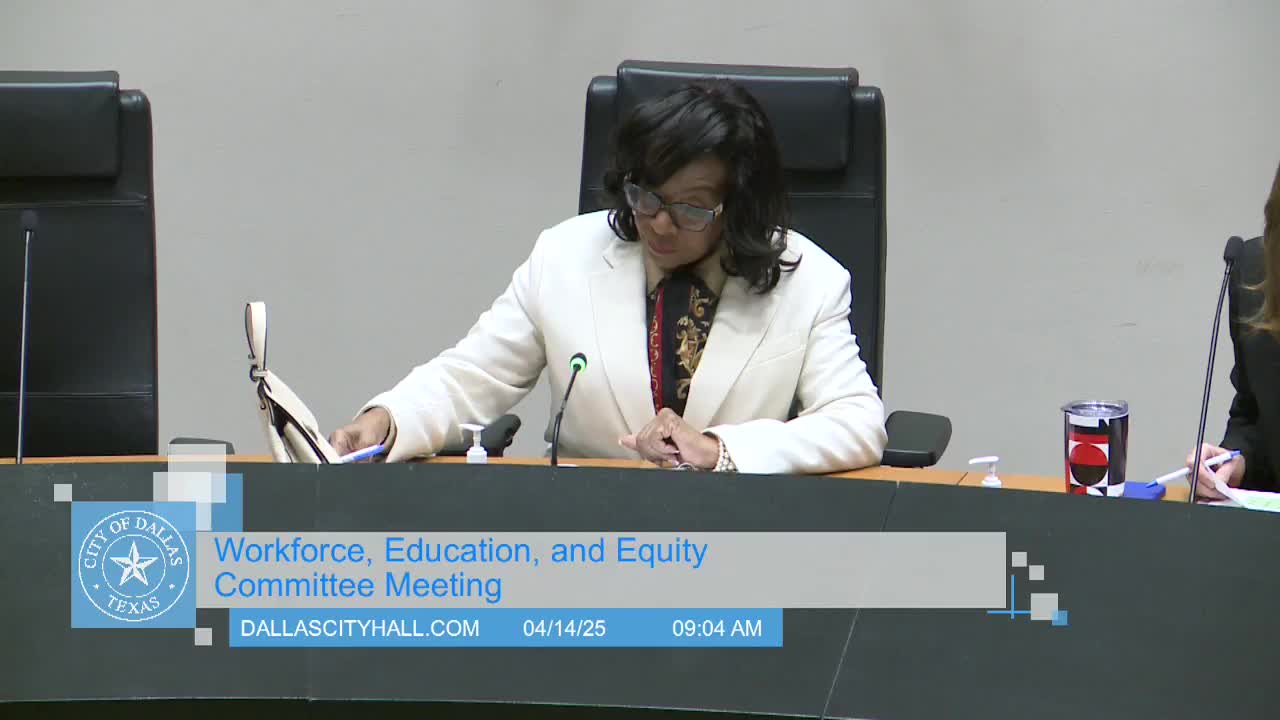City departments report progress under Dallas racial equity plan; indoor air upgrades, hiring initiatives highlighted
Get AI-powered insights, summaries, and transcripts
Subscribe
Summary
City department leaders briefed the Workforce, Education and Equity Committee on department-level progress measures tied to the city's racial equity plan, citing completed indoor-air upgrades, hiring through the Fresh Start reentry program, expanded fleet training, IT accessibility work and procurement steps to boost MWBE participation.
City department leaders briefed the Workforce, Education and Equity Committee of the Dallas City Council on April 14 on progress toward department-level measures in the city's racial equity plan, reporting completed indoor-air upgrades in targeted facilities, new training and recruitment steps and continued work on digital accessibility and procurement for historically underused businesses.
The committee heard from the Office of Equity and Inclusion interim director Hai Tran and leaders from Facilities and Real Estate Management, Equipment and Fleet Management, Information and Technology Services, Procurement Services and Civil Service on accomplishments through the end of 2024 and priorities for 2025.
The updates showed a mix of completed projects and ongoing work tied to equity performance measures. Brian Thompson, assistant director of Facilities and Real Estate Management, said the department exceeded its goals for improving indoor air quality in facilities located in historically impacted neighborhoods. Thompson described a two-pronged approach: replacing or upgrading HVAC systems where feasible and installing higher-rated filters or standalone HEPA units where systems could not accept improved filtration. The department had a target to replace equipment in 30 facilities and to deploy 15 standalone HEPA purifiers across fiscal years 2023 and 2024; Thompson reported 35 upgraded facilities and 21 standalone HEPA units installed in the targeted neighborhoods. He estimated the indoor-air work for the equity measure at about $1.2 million and said a broader citywide push had resulted in installations at 106 facilities and 321 standalone units, bringing the citywide indoor-air investment to roughly $2 million.
Thompson also reported a Fresh Start reentry-hiring goal to bring at least 10 eligible workers into facilities and real estate roles by the end of fiscal 2026; the department has hired seven so far and reported a 71% retention rate for those hires.
Vincent Olson, director of Equipment and Fleet Management, summarized workforce-development and service-quality efforts in the city's vehicle and equipment shops, including internal technical training classes (PM 2 and other modules), partnerships with community colleges and P-TECH programs, and a policy goal to limit preventive-maintenance (PM) compliance variance across service centers to no more than 15%. Olson described routine measurement of performance after training and the department's use of vendor lists that include historically underutilized businesses.
Kimberly Martin, fleet recruiter, said Equipment and Fleet Management currently employs three female technicians and described recruiting from P-TECH high school programs and local trade schools to diversify the applicant pool.
Tanisha Durissi, interim chief information officer in Information and Technology Services, said ITS completed a financial system upgrade in October 2024 that improved visibility into invoicing and accounts payable, a change intended to help vendors and departments track payments more easily. Durissi reported 60% of city web pages had been updated for ADA (Americans with Disabilities Act) accessibility compliance and said ITS is partnering with the Data Analytics and Business Intelligence team to monitor algorithmic bias and put AI governance policies in place as city departments explore artificial-intelligence tools.
Juanita Ortiz, director of Procurement Services, described procurement changes intended to increase opportunities for minority- and women-owned businesses (MWBEs), such as breaking large contracts into smaller awards, publishing a quarterly procurement plan to give subcontractors advance notice, and expanding mentor-protge9 programs. Ortiz previewed follow-up reporting on the Dallas Accelerator program; she said 26 businesses graduated from a 2024 cohort and that the program has produced two cohorts (52 graduates) since its 2023 inception.
Jared Davis, civil service board secretary and department director, described procedural changes prompted by a talent-acquisition audit. Davis said staff removed an arbitrary 30-day candidate freeze that blocked reapplicants, reduced requirements for duplicate documentation that had added barriers for applicants, and intends to create a recruitment-exchange forum to share best practices across departments for filling critical positions.
Committee members asked questions about retention in trade roles, how advisory-board participants are prepared to succeed, the scope and permanence of equity performance measures, and next steps for marketing career and vendor opportunities to residents. Committee members repeatedly noted the need to treat the racial equity plan as an ongoing, living program rather than a set of completed checkboxes.
"We need to make it a living, organic document," the committee chair said during discussion, urging staff to rethink reporting that marks ongoing standards as "complete." Assistant City Manager Padilla and department leads said many items now reflect standard procurement or capital-replacement policy changes (for example, requiring MERV 11 or higher in HVAC replacements) and that staff will return with additional detail on retention metrics and on how advisory-board experience and succession training are being institutionalized.
The committee also discussed workforce equity initiatives that cross departments, including ITS internships and partnerships with Dallas ISD, Dallas College and the UT system; the city's use of P-TECH pipelines to recruit technicians; and procurement outreach via chambers of commerce and the newly restructured Business Enterprise Hub.
The committee did not take any formal final action on the department progress measures during the presentation; presenters were asked to return with further detail and follow-up materials. Earlier in the meeting the committee approved the minutes from its March 4, 2025 meeting by voice vote.
City staff listed several near-term follow-ups: refined, ongoing performance reporting that avoids implying a finite end to systemic equity work; additional retention metrics for trade and technical roles; a presentation on the Dallas Accelerator results at a future meeting; and a staff note on AI governance and data-bias mitigation that ITS and Data Analytics and Business Intelligence are developing.
The committee has one more scheduled meeting in May, staff said.
